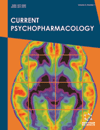-
s Psychiatric Polypharmacy, Etiology and Potential Consequences
- Source: Current Psychopharmacology, Volume 6, Issue 1, Apr 2017, p. 12 - 26
-
- 01 Apr 2017
Abstract
Psychiatric polypharmacy is defined as the use of two or more drugs in the treatment of a psychiatric condition. It is widely prevalent in clinical practice. The rationale for polypharmacy is not clear. Etiologic factors are patient demographics (age, gender, race, low socioeconomic status), personality disorder, psychiatric conditions (psychosis, schizophrenia, affective or mood disorders), comorbidities, severity of disease, treatment- refractoriness, prescribing practice, inpatient or outpatient setting, concern for reduction of extra-pyramidal and other sideeffects. Among children and adolescents’ the polypharmacy correlates are age (13 -15 years), male gender, caucasian race, low socio-economic status, medicaid or public insurance, disability, and foster care or child custody outside of biological family. Pediatric polypharmacy is also associated with a diagnosis of behavioral disorder, autism spectrum disorder, ADHD, conduct disorder/ oppositional defiant disorder, personality disorder, violence, tics, psychosis, affective and mood disorder. The concurrent administration of multiple drugs increases the risk of drug interactions and adverse effect including morbidity and mortality. Psychiatric polypharmacy is also associated with cumulative toxicity, poor medication adherence and treatment non-compliance. Thus, psychiatric polypharmacy poses a significant public health problem. However, not all polypharmacy is harmful. Polypharmacy is proven to be beneficial in patients with psychotic, mood or affective disorder, concurrently having dual diagnosis with substance abuse, personality disorder and certain medical conditions including thyroid, pain or seizure disorder. Combination therapy with different class of drugs (antidepressants or antipsychotics) with different mechanism of action have beneficial therapeutic consequences. Therefore, a better understanding of physicians’ rationale for polypharmacy, patient tolerability and effectiveness of prescribing strategy is needed to guide practitioners and to inform the development of evidence based treatment guidelines. Here we review the problem of polypharmacy in psychiatric patients, describe possible etiologic factors, associated consequences and provide recommendations for promoting beneficial polypharmacy and reducing harmful polypharmacy in clinical practice.


